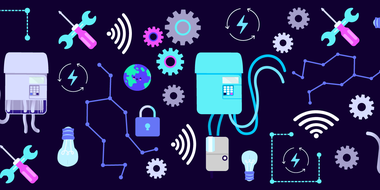The smart meter rollout: your questions answered
The UK’s smart meter rollout is powering ahead, giving households clearer, real-time insights into their energy use, making it easier to cut costs, shrink carbon footprints, and stay future-ready.
The rollout isn’t just an upgrade - it’s the foundation of a greener, smarter grid.
The Smart Meter Rollout is a UK government-led initiative to install smart meters in every home and small business nationwide.
To meet this target, the Department for Energy Security and Net Zero (DESNZ) or the Department of Business, Energy and Industry Strategy (BEIS) as they were previously called, introduced a four-year ‘Targets Framework’, with annual installation targets for energy suppliers. Under this framework, suppliers were required to install smart meters in 75.5% of eligible homes by the end of 2025.
At the end of June 2025, 69% of homes and smaller domestic premises across Great Britain had a smart meter.
Alongside DESNZ (who set the targets) and energy suppliers (who install the meters), the Data Communications Company (DCC) manages the smart network. Consumers are protected by the Office of Gas and Electricity Markets (Ofgem), an energy regulator that ensures energy suppliers adhere to specific codes of practice.
Beyond 2025, energy suppliers will continue to have smart meter installation targets to support the Clean Power 2030 objective and achieve net-zero greenhouse gas emissions by 2050.
In this blog, we’ll break down the key facts, answer your most common questions, and explore what the smart meter rollout means for the future.

Don’t have your hands on a smart meter yet? You can register your interest below for one, and we’ll let you know when we’re installing in your area.
Why are smart meters being rolled out?
History of the rollout:
In 2007, the Government outlined its commitment to improving the information available to customers about their energy use - something we couldn’t agree with more! This was to empower households to manage their consumption and reduce their carbon footprint.
Part of this was trialling smart meters and real-time displays for domestic consumers, with the intention of gradually rolling them out nationwide over the following decade.
In 2011, even before the DCC’s smart home network was in place, the government initiated the smart meter rollout with first-generation smart meters, known as SMETS1 or S1. Suppliers were given a 2019 deadline to complete the rollout, which was later extended to 2020.

As previously mentioned, we are now installing as part of the Targets Framework, which has been operative since 2022, and continues to drive progress in the national smart meter rollout.
This next phase builds on years of development and investment in digital energy infrastructure - from the launch of the DCC’s communications network in 2016 to the widespread deployment of second-generation SMETS2 smart meters. Each milestone strengthens the foundation of a smarter, more connected energy system.
Smart meter rollout beyond 2025:
The newer SMETS2 smart meters are connected to energy suppliers via a nationwide network run by the DCC. This network, known as the ‘digital spine’ of the energy system, enables regular remote upgrades and is future-proofed for changes to the grid.
Our energy infrastructure is poised to undergo significant changes over the next decade, shifting away from fossil fuels towards renewable energy sources and embracing greater energy flexibility.
Together, these advances are helping to modernise the UK’s energy system and support the transition to a cleaner, low-carbon future.
To be ready for the evolution, households and businesses will need to be equipped with the right technology. Smart meters are at the forefront of this shift, with a myriad of benefits for consumers, suppliers and energy networks across the UK:
For consumers:
- Ability to track energy in real-time (as frequently as every half an hour), helping implement energy-saving habits.
- Accurate bills, easier switching and the benefit of automatic readings.
- Access to smart and time-of-use tariffs that offer cheaper and greener off-peak energy.
- Integration with smart home technologies such as Electric Vehicles (EVs), chargers, home batteries and electric heating systems.
For suppliers:
- Fewer site visits due to the ability to send requests and upgrades to the meter remotely.
- Greater insight into energy usage patterns - providing more precise and forward-looking demand forecasts.
- Allows the development of dynamic tariffs and smart products.
- Increased operational efficiency by enabling streamlined maintenance and data-driven optimisation.
For networks:
Smart meters provide real-time data on energy consumption, which is crucial for balancing supply with demand:
- Enables a flexible energy system that works to balance the grid.
- Allows grid operators to manage large-scale battery storage systems and the intermittent nature of renewable energy sources.
- Improved energy security by reducing reliance on fossil fuels and imported gas.
Who is paying for the rollout of smart meters?
Energy suppliers install smart meters at no extra cost to you. Instead, as with the installation and maintenance of traditional meters, the price is covered through everyone's energy bills.
The rollout is expected to cost approximately £13.5 billion but is anticipated to generate savings of nearly £19.5 billion. Therefore, Britain is likely to benefit from an overall saving of nearly £6 billion between now and 2034.
Will smart meters be compulsory by 2030?
As traditional meters approach the end of their life, a smart meter will be offered as a replacement.
This is due to government-mandated obligations and because traditional meters are no longer manufactured or refurbished.
However, you are not legally required to have a smart meter, but we highly recommend it, as they offer a myriad of time and money-saving benefits.
We've written a whole blog post covering the most common questions about smart meters.
What are Octopus’s targets?
Our 2025 Install Targets are:
Electric: 405,628
Gas: 533,142
Overall: 938,770
You can read more about this here.
How do we plan to get it done?

Once a meter has passed its certification date, it needs to be replaced. This ensures the energy you use is always measured accurately, and you only pay for what you use.

Once this service ends, your meter’s timings might not work as expected and your heating and hot water supply could be affected.

These ‘smart-to-smart’ replacements are crucial for maintaining a reliable, future-proofed energy system that can keep pace with technological advancements.
4G communication hub replacements
All smart meters have a communications hub - it’s the bit that allows us to talk to your meters and receive your consumption data.
We are replacing older 2G/3G communications hubs (comms hubs) with new 4G comms hubs.
Across the UK, 2G and 3G networks will be phased out by the end of 2033, which will affect the connectivity of your current smart meter.
Switching to a 4G network now ensures that your smart meter continues to transmit automatic readings.
We’re replacing communication hubs for customers with SMETS2 smart meters (if they don't already have a 4G communications hub of course!)
If you have a SMETS1 smart meter, we’ll be in touch soon to upgrade your smart meter setup with the latest technology.
Why do smart meter customers get more goodies?
Smart meters show us how energy’s being used in near real-time – so we can reward you for using it when it’s greener or cheaper.
They also help us run things more efficiently, saving money we can pass back to you:
- Save on your bills with our smart tariffs
- Earn money and get rewards by joining Octoplus
- Change costly habits and cut your usage with energy insights in the Octopus Energy app
- Shift your energy use with our smart meter trials and challenges and be rewarded for going green
Will my bills change if I get a smart meter?
The tariff you’re on and the unit rate you pay will not change when you get a smart meter installed. A very small portion of your annual bill goes toward the upkeep of smart meters and network costs; however, this applies even if you have a traditional meter.
Your bills may change after you’ve had a smart meter installed if:
You’re replacing an old meter that was coming to the end of its operational life. Your old meter may not have been accurately recording your usage.
You didn’t submit regular meter readings before getting a smart meter. Lack of readings means your bills would have been based on estimates, so you may have been paying more or less than you needed to. We understand this may come as a surprise, and we don’t expect immediate payment for any revised balance. If you’d like to review your updated bill or adjust your Direct Debit, please get in touch - we’re here to help.
Do smart meters ever break?
While nothing is ever entirely certain, meters – smart or otherwise – are very unlikely to record usage incorrectly.
An exception may be if the meter is past its certification date, and all energy suppliers are obliged to reach out to you and offer a new one if yours is old.
We’ve tested thousands of meters at the request of customers over the years, and the number that were recording usage incorrectly was a tiny, tiny fraction compared to the millions of smart meters we’ve installed.
Is it compulsory to have a smart meter installed?
No, it’s not compulsory to have a smart meter installed. However, we recommend upgrading. Smart meters can save you time, effort and money by helping you manage your energy more efficiently.
Traditional meters are also no longer manufactured or refurbished, so as your meter nears the end of its life, a smart meter will be offered as a replacement.
If you're interested in a smart meter, please register your interest, and we'll send you an email when appointments become available in your area.
You can also log in to your online account to book it. Simply choose a date and time that works for you, and we'll take care of the rest!
Do all energy suppliers install smart meters?
Yes, all energy suppliers install smart meters.
Do you remove old meters when installing a smart meter?
Yes, when your meter is replaced, we will install the new smart meter in the same place as the old one. The engineer will take away the old meter once it has been safely removed.
Will I also get an in-home display?
Yes, you will be offered an In-home display or our innovative Octopus Home Mini.
Still unsure about getting a smart meter?
We’ve busted the most common smart meter myths to clear up any confusion.
Published on 26th November 2025 by:
Hey I'm Constantine, welcome to Octopus Energy!
×Close window

